Search Results
Search
Filter results
Advanced Filters
Your search returned 562 Solutions
-
Training educators and municipalities in inclusive physical education
Participants identify barriers to the inclusion of children with disabilities in their schools, and design and implement their own inclusive physical education activities involving staff, students, families, and the wider community. The in-person course was held from 2013 to 2016, in 2018 an online version was created.
Rodrigo Mendes Institute, Open Doors to Inclusion, Brazil -
Community Based Inclusive Development promoting Inclusive Education in Zanzibar
The project focuses on the training of teachers in inclusive methods and intervention, as well as on fostering greater community awareness by working with parents and administrators. The project has been implemented in three of Zanzibar’s eleven districts, and in 2018 more than 4,300 children with disabilities were enrolled.
MECP-Z - The Madrasa Early Childhood Programme Zanzibar, School Enrolment, Tanzania -
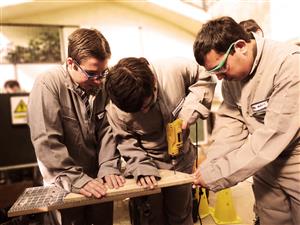
A certification scheme creates jobs for people with intellectual disabilities
Descúbreme Foundation developed a pilot project to certify the education of students with intellectual disabilities with the appropriate authority. Ten students were selected, eight of them passed the exam and found a regular job. Project staff provided support during the first six months of to ensure a smooth transition.
Fundación Descúbreme, Providing certification for secondary education and vocational training, Chile -
Creating mainstream schools in a war-torn country
The aim is to promote Inclusive Education at the community level with a focus on children with disabilities, girls and children of the Kuchi, a nomadic people.The programme provides services for 81,000 learners, of whom 65% are girls. The programme is also working with the government to develop an inclusive education strategy.
Swedish Committee for Afghanistan, Afghanistan -
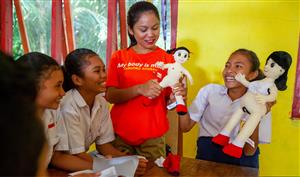
Sexual and reproductive education for youth with leprosy and other
disabilities
NLR Indonesia developed the MBIM project to educate children and adolescents with leprosy and other disabilities about their sexual and reproductive health and rights. As part of the project NLR has developed educational manuals and tools, such as pictures and videos.
NLR Indonesia, My Body Is Mine (MBIM), Indonesia -
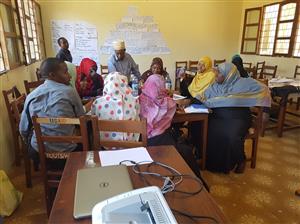
Inclusive Education teacher-training modules in university courses
Teacher training in Inclusive Education for pre-service teachers is an addition to the standard university course offerings and is free of charge. Seven training modules were developed, including a train-the-trainer model. The training is then followed by practical experience and actual implementation in selected schools.
State University of Zanzibar, Teacher Training in Inclusive Education, Tanzania -
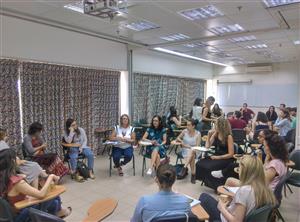
Supported education services for people with serious mental health issues
In the SES programme, the service recipients are assisted by professionell coordinators in their academic, emotional and social challenges during their studies. The aim is to create better access to academic frameworks and to promote the inclusion of programme graduates into the open labour market.
Israel Ministry of Health, SES Programme, Israel -
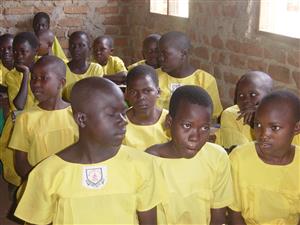
Indian campaign to educate visually-impaired children is going global
The project's aim is to provide guidelines, accessible teaching and learning materials, access to appropriate ICT and provision of capacity building programs for teachers and parents to promote inclusive education for 4 million blind and low vision children throughout the developing world who have no access to education.
ICEVI - International Council for Education of People with Visual Impairment, India -
In Italy, students with disabilities are not segregated
The Italian Framework Law for the Assistance, Social Inclusion, and the Rights of Persons with Disabilities is a binding policy prescribing that children with disabilities have to be included in mainstream schools at all levels. As a result fewer than 1% of all children with special needs are educated in segregated settings.
Italian Ministry of Education, Universities and Research, Framework Law for the Assistance, Social Inclusion and the Rights of Persons with Disabilities no. 104 of 5th February 1992 by the Ministry of Education, Universities and Research, Italy, Italy -
Building capacity to support the Inclusive Education of Children and Youth with Autism
PAT is a training programme for educational staff, families and service providers in dealing with pre-school children and students in an inclusive educational context. The introductory training is available online. Advanced training and on-site coaching is provided for professionals who design and manage programs for learners.
New Brunswick Department of Education and Early Childhood Development, New Brunswick Provincial Autism Training (PAT), Canada
- Page 1
- Page 2
- Page 3
- Page 4
- Page 5
- Page 6
- Page 7
- Page 8
- Page 9
- Page 10
- Page 11
- Page 12
- Page 13
- Page 14
- Page 15
- Page 16
- Page 17
- Page 18
- Page 19
- Page 20
- Page 21
- Page 22
- Page 23
- Page 24
- Page 25
- Page 26
- Page 27
- Page 28
- Page 29
- Page 30
- Page 31
- Page 32
- Page 33
- Page 34
- Page 35
- Page 36
- Page 37
- Page 38
- Page 39
- Page 40
- Page 41
- Page 42
- Page 43
- Page 44
- Page 45
- Page 46
- Page 47
- Page 48
- Page 49
- Page 50
- Page 51
- Page 52
- Page 53
- Page 54
- Page 55
- Page 56
- Page 57